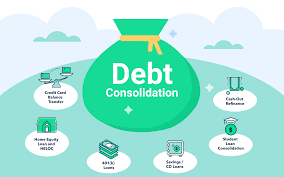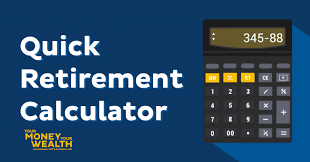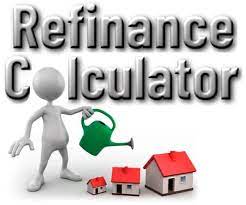Empower yourself to make informed decisions about consolidating your debts with tool like the Debt Consolidation Calculator (Debt Consolidation Loan Calculator). This calculator simplifies the evaluation process and provide valuable insights into potential interest savings and reduced monthly payments, guiding you towards a debt-free future.
Debt Consolidation Calculator
Results :-
Debt consolidation is a financial strategy that can help you manage your debts more effectively. If you have multiple debts with different interest rates, repayment terms, and monthly payments, consolidating your debts can simplify your finances by combining them into a single loan or credit account.
In this article, we will discuss what debt consolidation is, how it works, the benefits and drawbacks of debt consolidation, and some tips for consolidating your debts.
What is debt consolidation?
Debt consolidation is the process of combining multiple debts into one loan or credit account. This can be done by taking out a personal loan, home equity loan, balance transfer credit card, or other types of credit that allow you to pay off your existing debts.
The goal of debt consolidation is to simplify your finances by reducing the number of monthly payments you have to make and potentially lowering your overall interest rate. This can help you pay off your debts faster and more efficiently.
How does debt consolidation work?
Debt consolidation works by combining multiple debts into one loan or credit account with a lower interest rate, a longer repayment term, or both. This can help you save money on interest charges and reduce your monthly payments, which can make it easier to manage your finances.
To consolidate your debts, you will need to apply for a new loan or credit account and use the funds to pay off your existing debts. Once your debts are consolidated, you will only have to make one monthly payment instead of multiple payments to different creditors.
Is debt consolidation a good idea?
Whether debt consolidation is a good idea depends on your individual financial situation. Here are some factors to consider:
1. Your credit score
Your credit score will affect the interest rate and terms of the loan or credit account you use to consolidate your debts. If you have a good credit score, you may qualify for a lower interest rate and better terms. However, if your credit score is poor, you may not be able to qualify for a low-interest loan or credit account.
2. Your total debt
Before you consolidate your debts, calculate your total debt and the interest rates and monthly payments of each debt. This will help you determine how much you need to borrow and whether debt consolidation will save you money.
3. Your repayment schedule
Debt consolidation loans and credit accounts have fixed repayment schedules. If you consolidate your debts with a personal loan or debt consolidation loan, you will have a fixed monthly payment for a set period of time. If you consolidate your debts with a balance transfer credit card, you will have a low or 0% interest rate for a certain period, usually 12-18 months.
4. Your financial goals
Consolidating your debts can help you simplify your finances and potentially save money on interest charges. However, it’s important to consider your long-term financial goals. If you want to save for a down payment on a house or pay off your student loans, debt consolidation may not be the best choice.
Pros and cons of debt consolidation
Debt consolidation has several advantages and disadvantages. Here are some pros and cons to consider:
Pros
Simplified payments: With debt consolidation, you only have one payment to make each month. This can make it easier to manage your debts and avoid missed or late payments.
Lower interest rate: If you have high-interest credit card debt, consolidating your debts with a lower interest loan or credit account can potentially save you money on interest charges.
Fixed repayment schedule: Personal loans and debt consolidation loans have fixed repayment schedules, which can help you budget your finances more effectively.
Cons
Fees and interest charges: Some debt consolidation loans and credit accounts may have fees and higher interest rates than your existing debts, which can make debt consolidation more expensive in the long run.
Risk of losing collateral: If you take out a home equity loan or use your retirement savings to consolidate your debts, you risk losing your home or retirement savings if you cannot make payments.
Can lead to more debt: Debt consolidation is not a solution for underlying financial problems. If you continue to use credit cards or take out loans after consolidating your debts, you may end up in a worse financial situation than before.
how to consolidate debt? – 5 Best ways to consolidate debt
we will discuss the 5 best ways to consolidate debt.
1. Personal loan
A personal loan is a type of unsecured loan that can be used for a variety of purposes, including debt consolidation. With a personal loan, you borrow a lump sum of money from a lender and make fixed monthly payments for a set period of time.
The benefits of using a personal loan to consolidate your debts include a fixed interest rate, a fixed repayment schedule, and potentially lower interest rates than your credit cards. Personal loans are also unsecured, which means you don’t have to put up collateral like your home or car.
2. Balance transfer credit card
A balance transfer credit card is a credit card that allows you to transfer your existing credit card balances to a new card with a lower interest rate. Balance transfer cards usually offer a 0% introductory APR for a certain period, typically 12-18 months.
The benefits of using a balance transfer credit card to consolidate your debts include no interest charges for the introductory period, potential savings on interest charges, and the convenience of only having one payment to make each month. However, you should be aware that balance transfer cards usually charge a balance transfer fee, and if you don’t pay off your balance before the introductory period ends, you could end up paying high interest charges.
3. Home equity loan
A home equity loan is a type of secured loan that allows you to borrow against the equity in your home. With a home equity loan, you receive a lump sum of money and make fixed monthly payments for a set period of time.
The benefits of using a home equity loan to consolidate your debts include potentially lower interest rates than your credit cards, a fixed interest rate, and a fixed repayment schedule. However, you should be aware that home equity loans are secured by your home, which means you could lose your home if you cannot make payments.
4. Retirement account loan
If you have a retirement account like a 401(k) or IRA, you may be able to borrow against it to consolidate your debts. With a retirement account loan, you borrow a lump sum of money from your account and make payments back to the account, typically with interest.
The benefits of using a retirement account loan to consolidate your debts include potentially lower interest rates than your credit cards, no credit check required, and the ability to repay the loan over a longer period of time. However, you should be aware that if you cannot repay the loan, you risk losing your retirement savings and could face penalties and taxes.
5. Debt management plan
A debt management plan is a program offered by credit counseling agencies that helps you consolidate your debts and create a repayment plan. With a debt management plan, you make one monthly payment to the credit counseling agency, which in turn pays your creditors.
The benefits of using a debt management plan to consolidate your debts include lower interest rates and fees, a fixed repayment schedule, and the ability to work with a credit counselor to develop a budget and financial plan. However, you should be aware that debt management plans can take several years to complete, and you may be required to close your credit card accounts.
Explore a debt management plan
Debt can be overwhelming and stressful, but it doesn’t have to be. A Debt Management Plan (DMP) is an effective way to take control of your finances and work towards becoming debt-free. In this article, we will explore what a DMP is, how it works, and the benefits it can offer.
What is a Debt Management Plan?
A Debt Management Plan is an agreement between you and your creditors to repay your debt. It is typically offered by credit counseling agencies, which are nonprofit organizations that specialize in helping people manage their debt. The goal of a DMP is to help you pay off your debts in a reasonable amount of time, often 3-5 years, while still maintaining your basic living expenses.
How does a Debt Management Plan work?
When you enroll in a DMP, a credit counseling agency will work with your creditors to negotiate lower interest rates, waive fees, and set up a payment plan. You will make a monthly payment to the credit counseling agency, and they will distribute the funds to your creditors according to the payment plan.
To enroll in a DMP, you will typically need to provide information about your debts, income, and expenses. The credit counseling agency will use this information to create a budget and payment plan that works for you.
Benefits of a Debt Management Plan
There are many benefits to a Debt Management Plan, including:
Lower interest rates: A DMP can lower your interest rates, which can save you money on interest charges over time.
One monthly payment: Instead of juggling multiple payments to different creditors, you will make one monthly payment to the credit counseling agency, which will distribute the funds to your creditors.
Simplified budgeting: A DMP can help you create a budget and stick to it. This can help you avoid overspending and stay on track to becoming debt-free.
Debt-free in a reasonable amount of time: A DMP typically lasts 3-5 years, which means you can become debt-free in a reasonable amount of time.
Creditor relationships: When you enroll in a DMP, your creditors are more likely to work with you to resolve your debt. This can help you avoid collection calls and harassment from creditors.
Is a Debt Management Plan right for you?
A Debt Management Plan may be a good option for you if:
- You have unsecured debt, such as credit card debt, medical bills, or personal loans.
- You are struggling to make your monthly payments or are falling behind on payments.
- You can afford to make a monthly payment to the credit counseling agency.
- You are willing to change your spending habits and stick to a budget.
It is important to note that a DMP is not the right option for everyone. If you have secured debt, such as a mortgage or car loan, a DMP may not be able to help. Additionally, if you cannot afford to make a monthly payment, a DMP may not be a viable option.
How to find a reputable credit counseling agency
If you are considering a Debt Management Plan, it is important to find a reputable credit counseling agency. Here are some tips to help you find a trustworthy agency:
Look for a nonprofit organization: Nonprofit credit counseling agencies are typically more trustworthy than for-profit agencies.
Check for accreditation: Look for agencies that are accredited by the National Foundation for Credit Counseling or the Financial Counseling Association of America.
Research reviews: Look for reviews and testimonials from past clients to get an idea of the agency’s reputation.
Ask questions: Before enrolling in a DMP.
Stay committed to your DMP Once you enroll in a DMP, it’s important to stay committed to it. This means making timely payments each month and avoiding taking on new debt. Your DMP may last for several years, so it’s important to stay disciplined and committed to the process.
Monitor your progress You should receive regular updates from your credit counselor on the progress of your DMP. Make sure you review these updates and monitor your progress. If you have any questions or concerns, don’t hesitate to contact your credit counselor.
Celebrate your success Paying off your debt can be a long and challenging process, but it’s important to celebrate your successes along the way. Each time you pay off a debt or make a payment on time, take a moment to acknowledge your progress and celebrate your success.
In conclusion, a debt management plan can be a powerful tool for getting out of debt. By working with a credit counseling agency, you can create a customized plan that helps you pay off your debt and improve your financial situation. If you’re struggling with debt, a DMP may be the right solution for you.

Using the debt consolidation loan calculator is simple and straightforward. Here are the steps to follow:
Step 1: Gather Information on Your Existing Debts
Before you start using the debt consolidation loan calculator, you need to gather information on your existing debts, including the balance, interest rate, and repayment term. You can find this information on your credit card statements, loan agreements, and other financial documents.
Step 2: Enter Your Existing Debts
Once you have gathered information on your existing debts, enter the details into the debt consolidation loan calculator. This includes the balance, interest rate, and repayment term for each debt.
Step 3: Add a Consolidated Loan Option
Next, add a consolidated loan option to the debt consolidation loan calculator. This includes the loan amount, interest rate, and repayment term for the consolidated loan.
Step 4: Review the Results
Once you have entered all the details, review the results. The debt consolidation loan calculator will show you:
- Your monthly payments on the consolidated loan
- The total interest payable on the consolidated loan
- The total interest payable on your existing debts
- The total interest payable if you continue with your existing debts
Step 5: Compare the Results
Finally, compare the results and see how much you can save by consolidating your debts. If the total interest payable on the consolidated loan is lower than the total interest payable on your existing debts, debt consolidation can be a good option for you.
Benefits of Using a Debt Consolidation Loan Calculator
Using a debt consolidation loan calculator can offer several benefits, including:
- Helps You Manage Your Debt
A debt consolidation loan calculator can help you manage your debt by providing a clear picture of your current debt situation and the potential savings from consolidating your debts.
- Helps You Save Money
By using a debt consolidation loan calculator, you can compare different loan options and choose the one with the lowest interest rate and monthly payments. This can help you save money in the long run.
- Helps You Make Informed Decisions
A debt consolidation loan calculator can help you make informed decisions by providing accurate and reliable information on your debt situation and the potential savings from debt consolidation.
- Helps You Avoid Pitfalls
Using a debt consolidation loan calculator can help you avoid pitfalls, such as taking out a loan with high interest rates or long repayment terms. It can also help you avoid scams and fraudulent lenders.
Using a debt consolidation loan calculator can be a valuable tool for managing your debt and saving money. By following the steps outlined in this article, you can use the debt consolidation loan calculator to estimate your monthly payments and total interest payable on a consolidated loan. This can help you make informed decisions about whether debt consolidation is right
Example of Debt consolidation
To give you a better understanding of how loan consolidation calculators work, let’s take a look at an example.
Suppose you have three loans with the following balances, interest rates, and monthly payments:
Loan 1: $5,000, 12% interest rate, $175 monthly payment Loan 2: $10,000, 15% interest rate, $325 monthly payment Loan 3: $15,000, 18% interest rate, $425 monthly payment
Your total monthly payment for all three loans is $925, and you are paying a total of $5,850 in interest over the life of the loans.
Now, let’s say you decide to consolidate these loans into one loan with a 10% interest rate and a 5-year term. Using a loan consolidation calculator, you can determine your potential savings and new monthly payment.
Based on the calculator, your new loan would have a balance of $30,000, an interest rate of 10%, and a monthly payment of $636. This means that you could potentially save $289 per month and $17,340 over the life of the loan in interest payments.
However, it is important to note that not all loan consolidation calculators are created equal. Some calculators may not take into account fees or other charges associated with consolidation loans. It is important to research and use a reputable loan consolidation calculator to ensure that you are receiving accurate information.
In addition, loan consolidation may not be the best option for everyone. If you have a low credit score or high debt-to-income ratio, you may not qualify for a consolidation loan or may receive a higher interest rate. It is important to consult with a financial advisor or credit counselor to determine the best course of action for your unique financial situation.
In conclusion, loan consolidation calculators can be a useful tool in determining the potential savings and monthly payments of consolidating your loans. However, it is important to research and use a reputable calculator and consult with a financial advisor before making any decisions regarding loan consolidation.
Debt Consolidation – Fix the Real Problem First
Debt consolidation is a popular solution for managing multiple debts, as it simplifies payments and often offers a lower interest rate. However, it’s important to address the root cause of the debt problem before pursuing consolidation. In this article, we’ll discuss the importance of fixing the real problem first and offer tips for achieving financial stability.
Identify the Root Cause of the Problem
Before considering debt consolidation, it’s important to identify the root cause of the debt problem. This requires taking a hard look at your spending habits, income, and expenses. Ask yourself the following questions:
- How did I accumulate this debt?
- What are my current spending habits?
- Can I reduce my expenses?
- Can I increase my income?
- Am I living within my means?
Understanding the answers to these questions can help you create a budget and a plan to pay off your debt. In some cases, the root cause of the problem may be a lack of financial education or poor money management skills. In this case, it’s important to seek out resources for financial education and work to improve your financial literacy.
Create a Budget
Creating a budget is an essential step in achieving financial stability. Start by listing all of your sources of income and all of your expenses. This includes fixed expenses like rent or mortgage payments, utilities, and car payments, as well as variable expenses like groceries, dining out, and entertainment.
Once you’ve listed all of your expenses, categorize them into needs and wants. Needs are essential expenses like housing, utilities, and food, while wants are discretionary expenses like dining out and entertainment.
Next, look for areas where you can cut back on expenses. This might mean canceling subscriptions you don’t use, reducing your dining out budget, or finding ways to save on utilities.
Set Financial Goals
Setting financial goals is an important part of achieving financial stability. This might include paying off your credit card debt, building an emergency fund, or saving for a down payment on a house.
Once you’ve identified your financial goals, create a plan to achieve them. This might mean setting a timeline for paying off debt, or creating a savings plan to reach your savings goals.
Consider Debt Consolidation
After addressing the root cause of the debt problem, creating a budget, and setting financial goals, debt consolidation can be a helpful tool for managing multiple debts. This might include consolidating credit card debt, personal loans, or other types of debt into a single loan with a lower interest rate.
When considering debt consolidation, it’s important to shop around for the best rates and terms. Look for lenders that offer competitive interest rates, low fees, and flexible repayment terms. You can use a debt consolidation calculator to estimate your monthly payments and compare loan options.
FAQs
What is debt consolidation?
Debt consolidation is the process of combining multiple debts into a single, larger debt. This can be done in several ways, such as taking out a personal loan, using a balance transfer credit card, or working with a debt consolidation company.
Is debt consolidation a good idea?
Debt consolidation can be a good idea for some people, as it can simplify their debt repayment process and potentially reduce their interest rates. However, it’s important to consider the potential fees and charges associated with debt consolidation, as well as the impact on your credit score.
What types of debt can be consolidated?
Most types of unsecured debt can be consolidated, including credit card debt, personal loans, medical bills, and more. However, secured debts like mortgages and car loans typically cannot be included in a debt consolidation plan.
How does debt consolidation work?
When you consolidate your debts, you take out a new loan or credit card that is used to pay off your existing debts. This leaves you with a single payment to make each month, which can simplify your finances and potentially lower your interest rate.
What are the benefits of debt consolidation?
Some of the benefits of debt consolidation include simplified repayment, potentially lower interest rates, and the ability to pay off debts faster. Additionally, consolidating your debts can help you avoid missed payments, late fees, and other penalties.
Are there any downsides to debt consolidation?
While debt consolidation can be beneficial, there are also potential downsides to consider. For example, you may be charged fees or interest rates that are higher than your current debts. Additionally, if you miss payments or default on your new loan or credit card, your credit score could be negatively impacted.
Can I consolidate my debts on my own?
Yes, you can consolidate your debts on your own by taking out a personal loan or using a balance transfer credit card. However, working with a debt consolidation company can provide additional support and guidance throughout the process.
How do I choose a debt consolidation company?
When choosing a debt consolidation company, it’s important to do your research and consider factors such as their fees, reputation, and track record of success. You may also want to read reviews from other customers and check the company’s rating with the Better Business Bureau.
Will debt consolidation hurt my credit score?
Debt consolidation can potentially hurt your credit score in the short term, as you will have a new loan or credit card account. However, as you make on-time payments and pay down your debt, your credit score should improve over time.
How long does debt consolidation take?
The length of time it takes to consolidate your debt will depend on the method you choose and the amount of debt you have. For example, a personal loan or balance transfer credit card may be completed in a matter of weeks, while a debt consolidation plan may take several years to complete.
Conclusion
Using tools like the Debt Consolidation Calculator and Debt Consolidation Loan Calculator can significantly enhance your ability to make informed decisions about consolidating your debts. These calculators provide valuable insights into the potential benefits of debt consolidation, such as reduced monthly payments and interest savings, empowering you to take control of your financial future. By leveraging these tools and carefully evaluating your options, you can make strategic decisions that lead to a simplified financial life and a debt-free future. Start using these calculators today to assess your debt consolidation options and chart your course towards financial freedom.
Legal Notices and Disclaimer
All Information contained in and produced by the ModernCalculators.com is provided for educational purposes only. This information should not be used for any Financial planning etc. Take the help from Financial experts for any Finace related Topics. This Website will not be responsible for any Financial loss etc.





